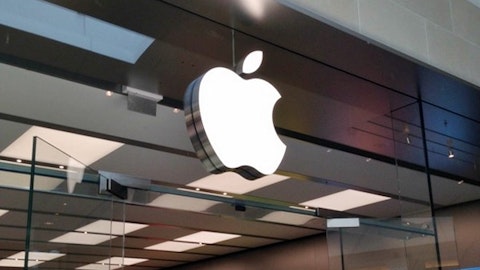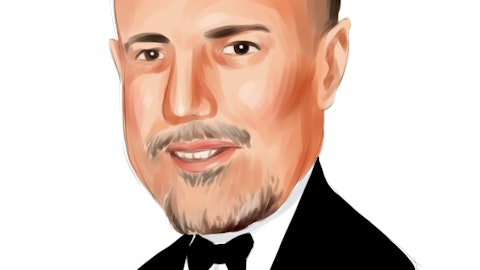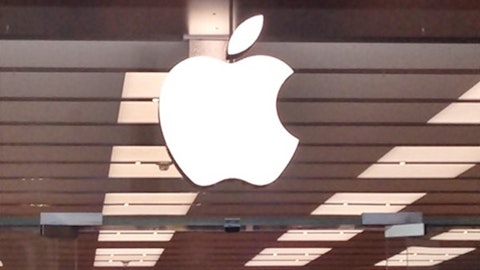The headlines on CNBC, Reuters and several other news sites following the May 15 deadline for 13F filings for the reporting period of March 31 screamed “top hedge funds dumping Apple” left, right, and center. The headlines were clearly for effect to some extent, as while numerous investors did sell out of Apple Inc. (NASDAQ:AAPL), our own data suggests there was no great sell-off of Apple’s shares, at least not among the top money managers in the world.

Giuseppe Costantino/Shutterstock.com
Overall, fund ownership increased slightly to 150 while the aggregate total of those funds’ invested capital climbed to $21.52 billion, an increase of 3%. However, given that Apple’s shares were up by nearly 13% during the first quarter, we do see that there was an overall decrease in share ownership among funds. Interestingly, the opposite phenomenon was true when looking solely at the billionaires we track. While several billionaires dumped their Apple Inc. (NASDAQ:AAPL) holdings completely, dropping billionaire ownership to 16 from 19, the capital they have collectively invested in the stock actually increased by over 22% to $13.05 billion. That easily outpaced the growth of the stock, indicating that billionaires (the top money managers in the world) collectively owned more Apple shares than they did at the start of the year.
What that strange dichotomy in activity among money managers means is open for interpretation. Less wealthy fund managers may feel the easy money has now been made in Apple Inc. (NASDAQ:AAPL), which has ridden a 7:1 stock split in June, 2014 and the overwhelming success of its iPhone 6 smartphones shortly afterwards to nearly 50% gains in its stock over the past year. Without any major growth catalysts in the foreseeable future save for yet more iPhone 6 models, which are likely to meet much stronger resistance than their forebears did, it’s hard to see where Apple, which owns one of the most profitable businesses ever, will drum up enough revenue growth to have a material impact on the stock over the next few quarters.
There is of course the Apple Watch, though somewhat-aggressive projections for the sale of that product have already been baked into Apple’s shares to some extent and the Watch may not even deliver on those; Morgan Stanley analyst Katy Hubert had predicted 36 million units sold in the first year of its release, which seems to be in jeopardy given that reports are indicating orders for the smartwatch have dropped dramatically after its first day of pre-order availability. When the device is made available in stores sales will no doubt spike again and the 2015 holiday season will no doubt lead to another sales spike and added interest in the device, but a more modest projection at this point might consist of 20 to 25 million sales, which may not do much to stem the tide of declining Mac and iPad sales.
Let’s take a look now at the billionaire activity in Apple during the first quarter. Carl Icahn remains the most bullish investor of the company, owning 52.76 million shares, unchanged during the quarter. Icahn recently revealed in a letter to Apple CEO Tim Cook that he believes Apple shares should be trading at $240 right now and that the company is poised to dominate TV and automobiles (though statements like that can only be taken with a grain of salt). Ken Fisher inched his position up slightly, to over 10.81 million shares, while David Einhorn trimmed his position by 14%. Stephen Mandel was one of the most bullish billionaires on Apple during the quarter, more than tripling his position to 6.84 million shares, while Ray Dalio hiked his smaller position by 183% to 732,997 shares. On the other hand, Rob Citrone slashed his holding by 42% while a couple of the billionaires that sold out of their Apple positions completely were Daniel Och of OZ Management and Leon Cooperman of Omega Advisors.
Follow Leon G. Cooperman's Omega Advisors
Another investor who sold off his Apple position in the first quarter was Jim Roumell, which we reported during an analysis of Apple’s stock back in February. Roumell felt that while there was still strength and potential in the Apple ecosystem, the stock had become too popular again and there was little room for error trading at close to 11 times earnings plus cash. According to Roumell, the easy money has been made, which may be the reasoning behind the migration of capital from the stock among the non-billionaire investors that we track. Those investors held just $8.47 billion worth of Apple shares, down from $10.21 billion three months earlier, despite those shares gaining nearly 13% in value. Factoring in the appreciation of shares, nearly $3 billion in capital was yanked out of Apple’s stock by the non-billionaire investors we track.
Let’s close by analyzing how tracking hedge funds can help an everyday investor. Through our research we discovered that a portfolio of the 15 most popular small-cap picks of hedge funds beat the S&P 500 Total Return Index by nearly a percentage point per month on average between 1999 and 2012. On the other hand the most popular large-cap picks of hedge funds underperformed the same index by seven basis point per month during the same period. In forward tests since August 2012 these top small-cap stocks beat the market by an impressive 84 percentage points, returning over 144% (read the details here). Hence a retail investor needs to isolate himself from the herd and take advantage of the prevalent arbitrage opportunities in the market by concentrating on small-cap stocks.
Disclosure: None





